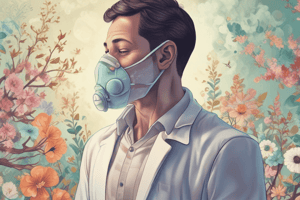Podcast
Questions and Answers
¿Cuál es la principal diferencia entre la rinitis alérgica y la no alérgica?
¿Cuál es la principal diferencia entre la rinitis alérgica y la no alérgica?
- La edad de inicio de los síntomas
- La duración de la enfermedad
- La causa subyacente de la inflamación (correct)
- La gravedad de los síntomas
¿Qué tipo de citocinas promueven la respuesta inmunológica mediada por células?
¿Qué tipo de citocinas promueven la respuesta inmunológica mediada por células?
- Tipo 4
- Tipo 2
- Tipo 1 (correct)
- Tipo 3
¿Cuál es un ejemplo de alérgeno ambiental que puede causar rinitis alérgica?
¿Cuál es un ejemplo de alérgeno ambiental que puede causar rinitis alérgica?
- Infecciones
- Aire frío
- Polen (correct)
- Cambios hormonales
¿Qué síntomas son comunes en la rinitis alérgica y no alérgica?
¿Qué síntomas son comunes en la rinitis alérgica y no alérgica?
¿Cuál es la función de las citocinas tipo 2 en la rinitis alérgica?
¿Cuál es la función de las citocinas tipo 2 en la rinitis alérgica?
¿Qué factor puede causar rinitis no alérgica?
¿Qué factor puede causar rinitis no alérgica?
¿Cuál es el síntoma más común de la rinitis alérgica?
¿Cuál es el síntoma más común de la rinitis alérgica?
¿Cuál es el paso inicial para diagnosticar la rinitis alérgica?
¿Cuál es el paso inicial para diagnosticar la rinitis alérgica?
¿Cuál es el tipo de reacción inmunológica que se asocia con la rinitis alérgica?
¿Cuál es el tipo de reacción inmunológica que se asocia con la rinitis alérgica?
¿Cuál es el grupo de personas que peutadricular más riesgo de desarrollar rinitis alérgica?
¿Cuál es el grupo de personas que peutadricular más riesgo de desarrollar rinitis alérgica?
¿Cuál es el objetivo principal del tratamiento para la rinitis alérgica?
¿Cuál es el objetivo principal del tratamiento para la rinitis alérgica?
¿Cuál es la función de las pruebas de alergia en el diagnóstico de la rinitis alérgica?
¿Cuál es la función de las pruebas de alergia en el diagnóstico de la rinitis alérgica?
¿Cuál es el tratamiento principal para la rinitis alérgica?
¿Cuál es el tratamiento principal para la rinitis alérgica?
¿Qué caracteriza la rinitis alérgica local?
¿Qué caracteriza la rinitis alérgica local?
¿Qué tipo de tratamiento puede ser efectivo para la rinitis alérgica local?
¿Qué tipo de tratamiento puede ser efectivo para la rinitis alérgica local?
¿Por qué la rinitis alérgica es considerada una enfermedad IgE-mediada?
¿Por qué la rinitis alérgica es considerada una enfermedad IgE-mediada?
¿Qué es esencial para el manejo adecuado de la rinitis alérgica?
¿Qué es esencial para el manejo adecuado de la rinitis alérgica?
¿Cuál es el impacto de la rinitis alérgica en la calidad de vida?
¿Cuál es el impacto de la rinitis alérgica en la calidad de vida?
Study Notes
Rinitis: A Comprehensive Overview
Rinitis is a collective term that refers to inflammation of the nasal mucosa, which can be caused by various factors. The two main types of rinitis are allergic rinitis and non-allergic rhinitis.
Allergic Rhinitis
Allergic rinitis, also known as hay fever, is an inflammation of the nasal passages and mucous membranes caused by an allergic reaction to environmental allergens, such as pollen, dust mites, or animal dander. The allergens trigger the immune system to produce antibodies, which then release histamine and other chemicals. These chemicals lead to the typical symptoms of allergic rinitis, such as sneezing, runny nose, and itchy eyes.
Non-Allergic Rhinitis
Non-allergic rhinitis is inflammation of the nasal passages and mucous membranes that is not caused by allergies. It can be caused by a variety of factors, including hormonal changes, excitement, cold air, infections, and certain foods or chemicals. The symptoms of non-allergic rhinitis are similar to those of allergic rinitis, but they are not due to an allergic reaction.
The pathophysiology of rinitis involves the immune response, which can be categorized according to patterns of cytokine production. Type 1 cytokines promote cell-mediated immunity, while type 2 cytokines mediate allergic responses. A full understanding of the pathophysiology and pathogenesis of rinitis does not presently exist, as it involves a complex interplay of immune responses, cell-mediated immunity, and humoral immunity.
Treatment for rinitis depends on the underlying cause. For allergic rinitis, treatment may include antihistamines, corticosteroids, and allergen immunotherapy. For non-allergic rhinitis, treatment may include saline nasal sprays, antihistamines, and decongestants.
Studying That Suits You
Use AI to generate personalized quizzes and flashcards to suit your learning preferences.
Description
Este quiz evalúa tu conocimiento sobre la rinitis, una condición que se caracteriza por la inflamación de la mucosa nasal. Aprende sobre las causas, síntomas y tratamiento de la rinitis alérgica y no alérgica.




